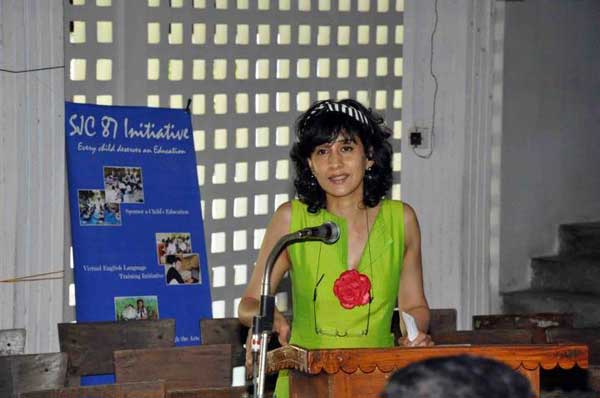Reply To:
Name - Reply Comment
Last Updated : 2024-04-19 21:46:00
 By D.B.S. JEYARAJ
By D.B.S. JEYARAJ.jpg)
.jpg) At the inception a clip from Tanya’s path-breaking recital at St. Martin’s in London was played over TV. This was her own composition “Adahas” meaning thoughts in Sinhala.The piece titled " Adahas:of wings of roots” was created specifically for the London recital in about fifteen minutes.It integrates some elements of Bach,Beethoven and Ravel in synergy with certain sounds of traditional Sri Lankan music. While Adahas relates to thoughts the term “wings” is a metaphor for re-invention and “roots” represents the sources of the compositions. The Chundikuli audience was enthralled by the performance.
At the inception a clip from Tanya’s path-breaking recital at St. Martin’s in London was played over TV. This was her own composition “Adahas” meaning thoughts in Sinhala.The piece titled " Adahas:of wings of roots” was created specifically for the London recital in about fifteen minutes.It integrates some elements of Bach,Beethoven and Ravel in synergy with certain sounds of traditional Sri Lankan music. While Adahas relates to thoughts the term “wings” is a metaphor for re-invention and “roots” represents the sources of the compositions. The Chundikuli audience was enthralled by the performance.
.jpg) ABSTRACT
ABSTRACT
Add comment
Comments will be edited (grammar, spelling and slang) and authorized at the discretion of Daily Mirror online. The website also has the right not to publish selected comments.
Reply To:
Name - Reply Comment
On March 26, a couple arriving from Thailand was arrested with 88 live animal
According to villagers from Naula-Moragolla out of 105 families 80 can afford
Is the situation in Sri Lanka so grim that locals harbour hope that they coul
A recent post on social media revealed that three purple-faced langurs near t